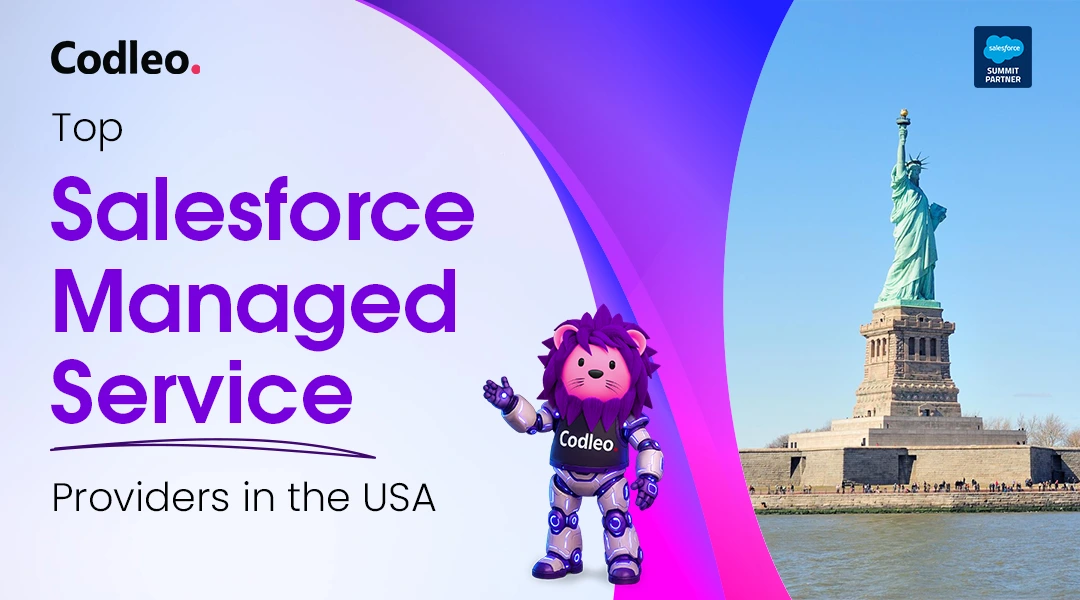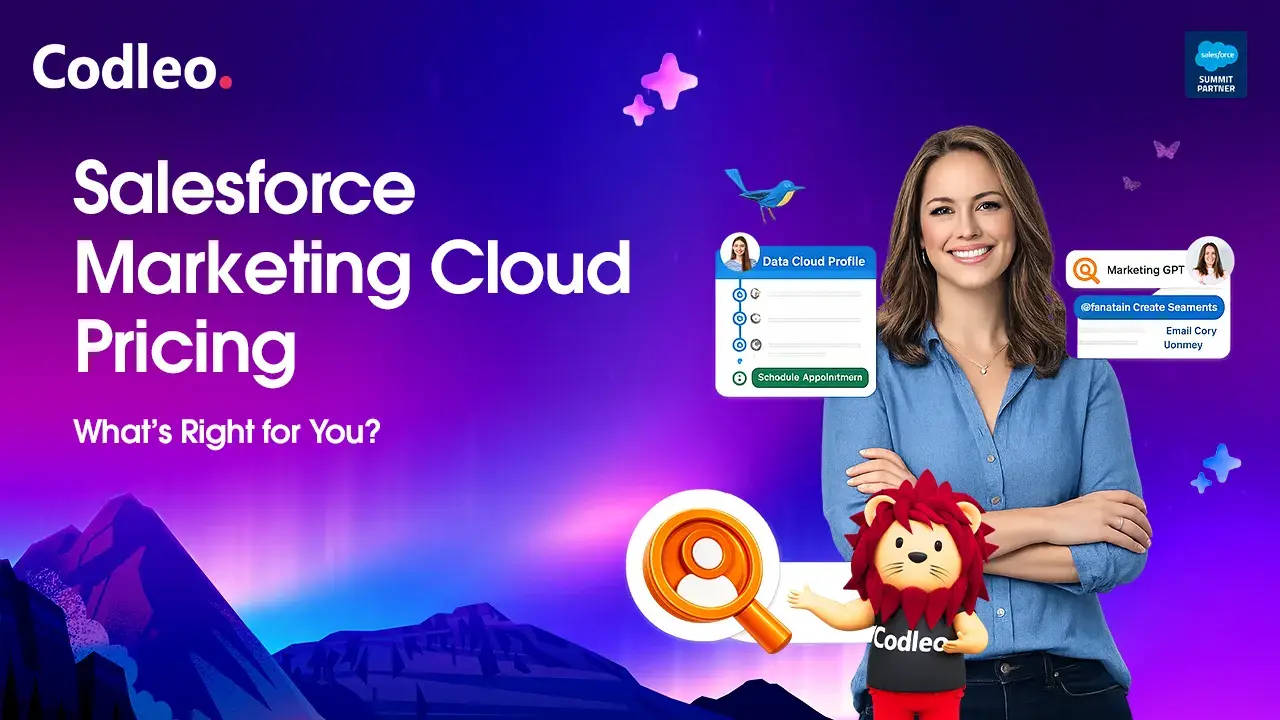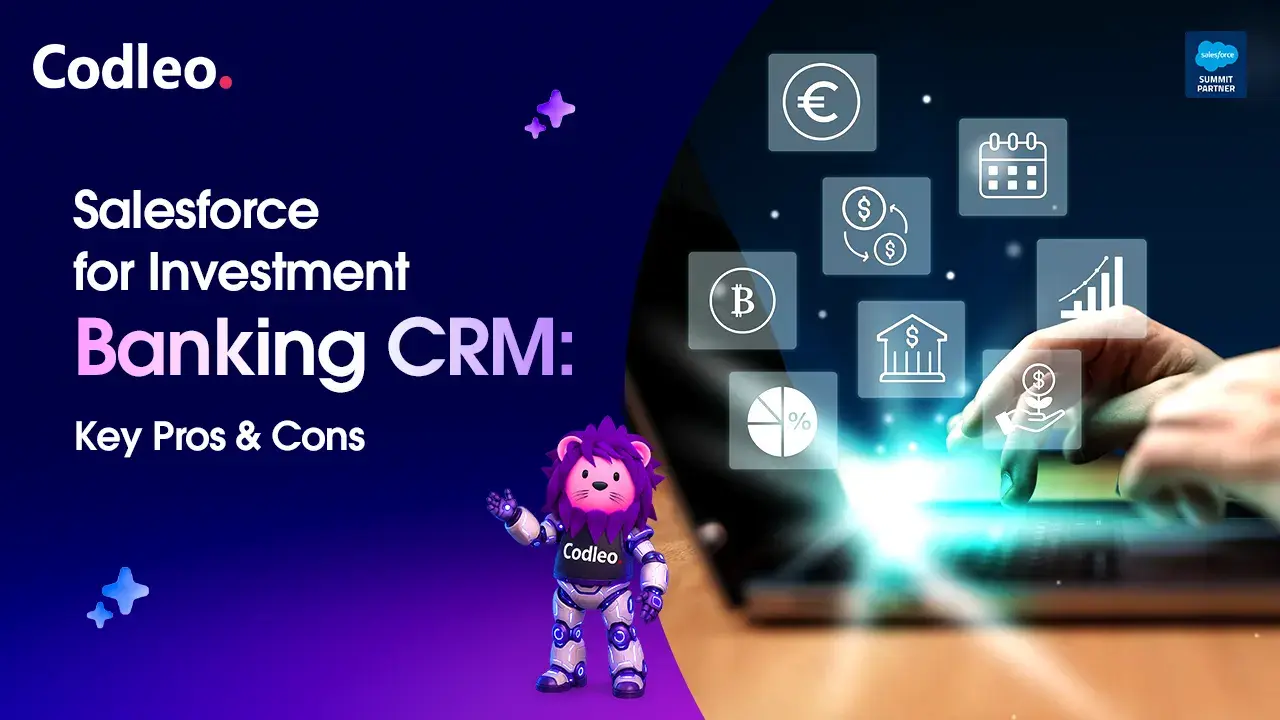Publish date:
As per your business requirements, you should understand the differences between Salesforce's two main clouds - Sales Cloud and Service Cloud. This comparison will help you determine which cloud suits your specific business needs. Sales Cloud and Service Cloud surely share critical features since both are built on the core Salesforce Platform. Moreover, these two clouds remain fairly unique in their specific functionalities.
Sales Cloud primarily focuses on sales representatives and managers, offering key functionality for account acquisition and deal closure. Furthermore, it supports the entire sales funnel process to help teams manage their sales activities effectively. According to the design, Service Cloud is intended for service agents and service managers. This platform is designed specifically for the needs of customer service teams. The main features focus on enhancing agent performance, improving customer experience, and resolving customer service issues in accordance with your company's processes and service agreements. It is done regarding your specific SLAs and work methods.
This guide compares Sales Cloud and Service Cloud to help you understand their key differences. Moreover, it analyzes which platform best suits different business requirements. We are seeing that Sales Cloud primarily focuses on generating high sales and acquiring new leads, while Service Cloud concentrates solely on customer service and case management. According to this guide, there are significant differences between the two modules in terms of their functions. This analysis examines these key differences despite some similarities.
Moreover, I have shared my views on what would work best for your specific business requirements. Sales Cloud actually helps teams manage customer sales processes, while Service Cloud definitely focuses on customer support activities. Both platforms serve different business functions, but work together to provide complete customer management.
What is Sales Cloud?
Sales Cloud is a digital system that enables companies to manage their customer relationships and sales processes in one centralized location.
Sales Cloud is a Salesforce product that manages sales processes automatically and provides analysis. It further helps organizations track sales activities and improve the sales process itself. This tool actually helps sales managers and representatives work better. They can definitely organize their tasks and complete their work more efficiently. Sales managers can create sales plans and track the performance of salespeople using performance metrics, which helps improve the overall work of the sales team.
Sales representatives can communicate more easily with customers using Sales Cloud AI. This tool collects interactions from social media and email, allowing them to manage all customer conversations in one place.
With enhanced automation capabilities, sales representatives have more time to nurture leads and close deals, focusing on pricing data management, customer records, and contract drafting. Moreover, the progressive implementation further collects contact and account information to understand customer requirements better.
What is Service Cloud?
Service Cloud is a customer service platform that helps businesses manage support tickets and customer interactions. It definitely provides tools for case management, knowledge bases, and multi-channel customer support.
Using Salesforce Service Cloud actually enables users to serve customers faster and more effectively. It definitely leads to keeping more customers happy and loyal. Furthermore, as per customer support requirements, Service Cloud offers integration with various communication channels to facilitate faster delivery of assistance.
The UI actually helps teams talk across different channels and manage their knowledge base. It definitely streamlines customer service, making it work automatically and simply. A well-maintained knowledge base enables agents to answer questions more efficiently and quickly, while also training new personnel in the same manner.
Service Cloud helps organize customer service work with simple tools that track how service teams perform effectively. It clearly indicates where employees require additional training and growth opportunities.
Sales Cloud vs. Service Cloud: Key Differences
Salesforce offers two popular products designed to support different aspects of business: Sales Cloud and Service Cloud. While they share some standard features, each serves a distinct purpose—Sales Cloud focuses on streamlining sales activities and managing leads, opportunities, and customer relationships, whereas Service Cloud is tailored for delivering exceptional customer service and managing support cases. Understanding the differences between these two platforms is crucial for selecting the best solution that aligns with your business objectives. Let’s explore the key distinctions between Sales Cloud and Service Cloud to help you make an informed decision.
Key Features of Salesforce Sales Cloud
Here are some enticing features of Sales Cloud,
Managing Leads Effectively
With Sales Cloud, you can easily track valuable leads. You can also manage these leads by personalizing your campaigns. Overall, this approach enhances sales and effectively captures customers' attention.
Reports
The Sales Cloud helps businesses track their reports. It shows them their strengths and weaknesses. The company can access the dashboard or reports from anywhere at any time.
Fast-Track Work Approvals
Organizations can quickly create immediate plans using visual workflows. They have fast ways to confirm sales, discounts, and expenses.
Salesforce Email to Case Overview
This automated response sends emails to case entries based on the features of the record.
Managing Contacts and Accounts
Sales Cloud manages and controls various aspects of business operations. It includes handling business contacts, customer communications, and other essential factors.
Mobile Optimization
Your phone can act like a small office management tool. You can log calls, analyze reports, and see work opportunities. You can also switch between dashboards, manage leads, and more.
Key Features of Salesforce Service Cloud
The Service Cloud includes many features from the Sales Cloud, along with additional functionalities, making it a unique and powerful module.
Some key features of the Service Cloud are:
Chat Services
Service Cloud offers chat services with live assistants to help customers online. This service provides support for questions about products and services.
Customer Service
Service Cloud offers excellent customer service all in one social platform. The best part is that customers don’t need to visit any other website.
Knowledge Base
Service Cloud helps create a knowledge base that benefits agents. This system enables agents to find answers quickly, resulting in more effective issue resolution.
Service Console
An expert helps manage important cases and tasks effectively. It allows customers to benefit from your services accurately.
Comparing Features of Salesforce Sales Cloud and Service Cloud
Service Cloud and Sales Cloud from Salesforce have some similarities, but they are not the same.
I recommend Salesforce Sales Cloud for sales-oriented businesses. It has features that turn leads into accounts.
On that note, a few unique Salesforce Sales Cloud features include,
-
Sales Contracts
-
Sales Forecasting
-
Territory Management
-
Quotes
-
Opportunity Splits
Salesforce CPQ is a valuable add-on for Sales Cloud. The main benefit of using Salesforce CPQ is that it helps you create accurate quotes for any products easily. However, the quoting process must follow specific rules. These rules cannot be accessed with a Salesforce Service Cloud license.
Salesforce Service Cloud helps businesses manage customer service effectively. It also boosts the productivity of customer service agents. For these reasons, I recommend using this Salesforce tool in service-focused companies.
Salesforce Service Cloud offers several unique features:
-
Service Console: This provides a single workspace for agents to manage customer interactions.
-
Service Analytics: This offers detailed insights into how well agents are performing.
-
Field Service: This tool helps schedule and organize on-site visits for customers.
It isn't easy to choose which is better for the organization: Sales Cloud or Service Cloud. Both serve different departments and have features that cater to the specific needs of those departments.
Standard Functionalities Between Sales Cloud and Service Cloud
Sales Cloud and Service Cloud in Salesforce have some key differences, but they also share several standard features. Understanding these features is crucial for identifying the differences between the two clouds.
-
Get essential customer data and history of interactions using the Basic Accounts & Contacts feature.
-
Improve customer service by using Basic Case Management. This tool helps you handle questions, feedback, and issues effectively.
-
Learn how to understand performance and visualize data with Reports and Dashboards.
-
Organize your tasks, activities, and campaigns using built-in tools.
-
Plan events and appointments using calendars and event scheduling tools.
-
Use a self-service portal and an integrated content library.
-
Easily connect with Chatter, Einstein Analytics, and other Salesforce Clouds for additional pricing.
-
Boost your flexibility and work from anywhere with the Salesforce mobile app.
-
Choose from more than 4,000 free and paid apps available in the AppExchange marketplace.
Sales Cloud vs Service Cloud: What Makes Them Different
When you use Sales Cloud, you get leads and turn them into business opportunities. You can manage campaigns, call new opportunities, and handle existing ones. Sales Cloud also helps you with market forecasting. In addition to maintaining customer relationships, you create space for your business to grow.
Service Cloud focuses on improving the after-sales process. It helps resolve customer issues more quickly. When Service Cloud is used effectively, it enhances the customer experience. You can also streamline workflows and automate service processes. Additionally, it provides support for customer service agents.
The main goal is to build personal relationships with each customer. These relationships happen across various channels.
Service Cloud keeps all your confidential data safe in the cloud. It also provides tracking reports that help identify problems in your business processes. By addressing these issues, you can improve your overall sales.
Which Is Right for You: Sales Cloud, Service Cloud, or Both?
Deciding whether to use Salesforce Sales Cloud, Salesforce Service Cloud, or both depends on what your business needs.
If your main goal is sales, then Salesforce Sales Cloud may be the best choice for you. It helps sales teams keep track of leads, opportunities, and customer interactions. It also automates sales tasks, manages leads and opportunities, forecasts sales, and provides insights into sales performance.
If you want to focus on customer service and support, consider using Salesforce Service Cloud. It helps service teams manage customer questions, track cases, and handle interactions. It also automates service tasks and provides insight into how well customer service is performing.
If you want a complete customer-focused experience, it's best to use both Salesforce Sales Cloud and Salesforce Service Cloud. This combination enables sales and customer service teams to share the same customer information and history, facilitating more effective collaboration and communication. Salesforce offers a package called Salesforce Sales+Service Cloud, which combines both Sales Cloud and Service Cloud into a single offering.
Pros and Cons of Salesforce Sales Cloud
Salesforce Sales Cloud can enhance sales performance and help businesses connect more effectively with customers. It has many benefits, but users should be aware of its complexity and costs. Let’s look at the pros and cons of using it.
The advantages of using Salesforce Sales Cloud include:
-
Improved sales productivity. It automates manual tasks and streamlines sales processes. It allows sales teams to spend more time selling and building relationships with customers.
-
Improved teamwork. A centralized platform enables teams to share updates and insights, fostering better collaboration, increased efficiency, and enhanced customer service.
-
Higher lead conversion. It effectively tracks and manages leads from initial contact to conversion, enabling personalized interactions and timely follow-ups.
-
Real-time insights. It provides immediate views of sales performance and pipeline, helping teams to tackle challenges quickly and take advantage of opportunities.
Salesforce Sales Cloud offers numerous benefits, but it's crucial to consider its potential drawbacks before making a decision. Here are some limitations to consider:
-
Complexity. New users may find the features and customization options challenging so that they will need proper training and support.
-
Implementation and customization. Adjusting Sales Cloud to match specific business processes can take a lot of time and resources. It highlights the importance of expert assistance and meticulous planning.
-
Cost. Sales Cloud is a premium CRM solution, which means licensing and implementation can be expensive. It can be a concern for smaller businesses or those with tight budgets. Organizations should evaluate their finances and consider potential benefits before choosing Sales Cloud.
Want to improve your CRM strategy? Contact Codleo's experts for a tailored Salesforce Sales and Service Cloud solution designed for your needs.
Pros and Cons of Salesforce Service Cloud
Salesforce Sales Cloud is a strong tool that helps improve sales processes and customer interactions. It has many benefits, but businesses must handle customization and integration challenges to maximize its potential.
Let’s take a closer look at some of the key advantages first:
-
Improved customer satisfaction. Service Cloud helps make customers happier by providing personalized and efficient support. Features such as self-service options and effective case management encourage loyalty.
-
Simplified service operations. With automation and workflows, Service Cloud makes support processes easier. It ensures inquiries are handled quickly and effectively through automatic routing and smart case assignments.
-
Better teamwork. Service Cloud fosters collaboration throughout the organization. It enables instant sharing, case transfers, and the utilization of teamwork tools, resulting in faster problem-solving and knowledge sharing.
-
Helpful reporting and analytics. Service Cloud provides tools to track service performance and customer satisfaction. Businesses can identify areas for improvement, measure agent productivity, and use data to make better decisions.
Salesforce Service Cloud has many benefits, but it also has some limitations.
Here are some potential disadvantages to consider:
-
Customization complexity: Customizing Service Cloud can be difficult. It often requires special knowledge for unique or complex workflows. Obtaining the proper support can make this process easier.
-
Integration challenges: Connecting Service Cloud with existing systems, especially older ones, can be complicated. To achieve a smooth integration, careful planning and expert help are essential.
-
Cost considerations: The cost of Salesforce Service Cloud might be a barrier for smaller businesses or those on a tight budget. However, the long-term benefits of improved customer service and efficiency might make the investment worthwhile. Effective budget management and understanding return on investment (ROI) are essential.
When To Opt for Sales Cloud Vs Service Cloud?
Choosing between Salesforce Sales Cloud and Service Cloud is easier once you understand your organization’s needs and goals. If your business is focused on increasing sales, Sales Cloud can help you manage your sales team, automate sales tasks, and gain insights into customer interactions.
If you focus on customer service and support, Service Cloud has helpful tools. It includes case management, self-service portals for customers, and knowledge bases. These features can help your team meet customer needs more effectively.
Businesses that need both sales and service should choose the Sales+Service package. This package costs more than buying the Sales Cloud and Service Cloud separately.
The main benefit of this package is that both departments can share and use the same customer data.
Codleo – Your Trusted Salesforce Partner
Codleo is a certified Salesforce Consulting partner. We help you choose the right solution and implement it to get the most value for your organization. Our customized solutions ensure that your teams, whether in sales or customer service, have the tools they need to succeed and grow.
Summary
Now that you understand the differences between Salesforce's two main products—Sales Cloud and Service Cloud—you can confidently explore Salesforce for your business.
Sales Cloud and Service Cloud are built on the Salesforce Platform, sharing essential features like accounts, contacts, and case management. However, they each have their focus. Sales Cloud is designed to manage leads and opportunities, including tracking sales pipelines and forecasts. On the other hand, Service Cloud is geared towards case management, providing more support channels and options for self-service.
Sales Cloud and Service Cloud are both excellent tools from the Salesforce platform. For over twenty years, these top CRM products have shown their ability to boost the productivity of sales and customer service teams.
If the standard features of Salesforce Service Cloud or Sales Cloud don’t meet your needs, you can customize your experience. Professional Salesforce consultants can help you get the most out of the platform for your business.
Codleo Consulting is a Salesforce partner that has helped over 300 clients in different industries. Our Salesforce expertise has improved deal closure rates by 26% and increased sales productivity by 38%. We have over 100 positive reviews on AppExchange and Clutch.co and success stories on our website.
Book a free Salesforce consulting call, and we’ll show you how Salesforce’s solution can be tailored to your every tiny request.
FAQ
The main difference between Salesforce Sales Cloud and Service Cloud is their focus. Sales Cloud aims to simplify sales and marketing, while Service Cloud enables support agents to deliver exceptional customer service and resolve issues before they arise.
Sales Cloud does not include Service Cloud in Salesforce by default. However, Sales Cloud has some features that allow for basic case management. You can also purchase the Sales and Service Cloud bundle for an extra $25 per user per month, in addition to the initial licensing cost.
Service Cloud has unique features for customer support that are not available in Sales Cloud. These include tools for managing cases across different channels, converting web submissions and emails into cases, and setting up rules to help support agents work more efficiently.
If your business focuses on sales, choose Sales Cloud. It offers features such as managing your sales pipeline, forecasting, and automating marketing tasks. If your business focuses on customer service, go with Service Cloud. It provides tools for case routing, self-service options, and managing a knowledge base. If you need both strong sales and service operations, consider using a combined solution.
Sales Cloud and Service Cloud offer different pricing levels tailored to specific features and user needs. Both provide basic options, but the cost changes depending on the tools and functions you require.
Yes, Salesforce Sales Cloud and Salesforce Service Cloud can work together to create a better experience for customers. This integration lets sales and customer service teams share the same customer information and history. As a result, they can collaborate more effectively.
Choosing the right Salesforce option depends on your business needs. If you mainly focus on sales, Salesforce Sales Cloud is likely your best choice. If your priority is customer service and support, then Salesforce Service Cloud is a better fit. You can also use both options together.
Sales teams and organizations mainly use Salesforce Sales Cloud to manage and track leads, opportunities, and customer interactions. It suits businesses of all sizes, from small startups to large enterprises, across various industries, including technology, healthcare, financial services, and retail. Sales Cloud helps sales teams automate their processes, manage leads and opportunities, forecast sales, and gain a deeper understanding of their sales performance.
Salesforce Service Cloud is used by customer service teams and companies that want to handle and track customer questions, cases, and interactions. Many businesses, like retailers, healthcare providers, financial institutions, and tech companies, can benefit from it. Service Cloud helps customer service teams manage inquiries and support cases, automate service tasks, and measure their performance in customer service.















